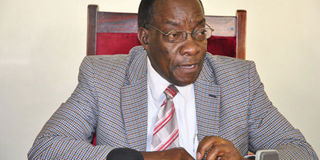EC stops early campaigns

EC officials led by the chairperson, Mr Badru Kiggundu, are traversing the country sensitising the media about election coverage and updating them about the roadmap to the 2016 elections
MASAKA, MBALE, LIRA. The Electoral Commission (EC) has directed aspirants for elective positions in the forthcoming 2016 elections to stop early campaigns until the Commission releases the official campaign programme.
The EC, which is charged with organising national elections, also warned it would ban all fundraising activities in public places in the country after the nomination of candidates is done to ensure free and fair elections.
EC officials led by the chairperson, Mr Badru Kiggundu , are traversing the country sensitising the media about election coverage and updating them about the roadmap to the 2016 elections.
Ms Okello, the commissioner in charge of South Western zone, told journalists in Masaka that campaigns have a specific period within which they are conducted. Campaigning now, she warned, tantamounts to manipulating the exercise and voters’ choices of candidates.
“We have not yet released the campaign timetable as EC, but some politicians are behaving as if we are already in the campaign period. This is unacceptable and we have notified them to stop,” she said. Ms Okello said police have been notified to take up the matter.
The pronouncement comes at the peak of the pre-elections fever generated by both incumbent politicians and those seeking to unseat them. The kakuyege (grass root canvassing) has intensified with MPs deserting Parliament and civil servants enduring a balancing act ahead of the EC whistle.
Ms Okello said some prospective aspirants have already started spending money on printing posters and other promotional items before nominations.
Is the President affected?
On whether the directive will also apply to President Museveni who is traversing the country while meeting various groups of NRM supporters and launching various government programmes, Ms Okello indistinctly responded: “It is very difficult to distinguish whether he is doing his normal duties as head of State, but if we see anything like campaigning, we shall draw his attention.”
EC spokesperson Jotham Talemwa said the Commission is going to conduct more regional workshops to equip journalists with basic skills on election reporting.
While in Lira District, Mr Steven Ongaria, the Commissioner in-charge of northern Uganda, revealed that the EC will not entertain activities that would compromise free and fair elections ahead of the February 2016 exercise.
The activities he mentioned include candidates’ promises and handouts to electorates and conducting fundraising where politicians are always invited to donate cash and other gifts.
“At this point, if anybody dishes out money or gives iron sheets to electorates, we shall not do anything much, but for, us we shall come in to bite after the nomination,” he said.
Meanwhile, Mr Kiggundu while meeting journalists in Mbale last week, disclosed that government had failed to secure Shs500 billion needed by the EC to enable it organise local council elections.
Electoral Commission under fire
Although Article 62 of the Constitution guarantees independence of the Electoral Commission both in decision making and financing, its critics insist it is not independent enough to deliver credible elections.
A European Union election observation mission report on the 2011 general elections noted that although the results showed some improvements in comparison to the 2006 election, the electoral process was marred by avoidable administrative and logistical failures, which led to a huge number of electorates being disenfranchised.Besides, the power of incumbency was also put under scrutiny to the extent that it compromised the level of playing field between the competing candidates and political parties.
Compiled by Martins E Ssekweyama, Al-Mahdi Ssenkabirwa, Bill Oketch,
Elizabeth Alabba and David Kazungu




